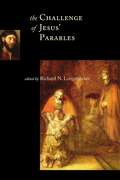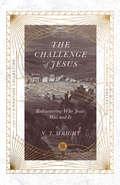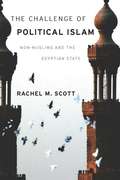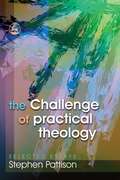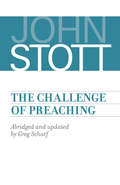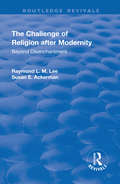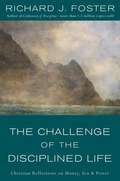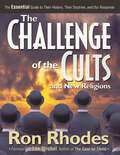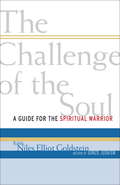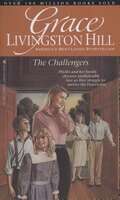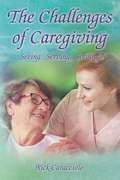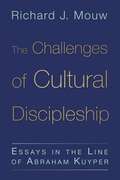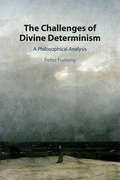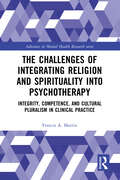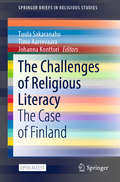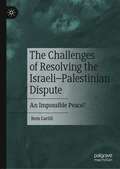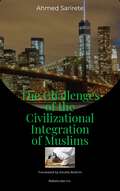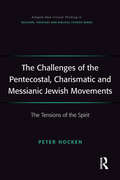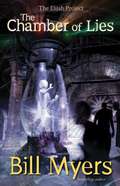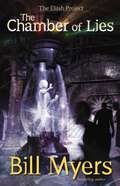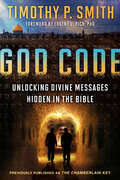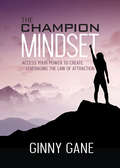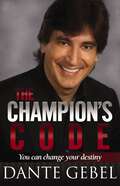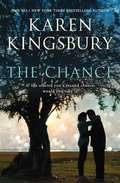- Table View
- List View
The Challenge of Jesus' Parables
by Richard N. LongeneckerA fresh look at the meaning of Jesus' parables for Christian living today. The parables recorded in the Gospels are central for an understanding of Jesus and his ministry. Yet the parables are more than simple stories; they present a number of obstacles to contemporary readers hoping to fully grasp their meaning. In this volume, thirteen New Testament scholars provide the background necessary to understand the original context and meaning of Jesus' parables as well as their modern applications, all in a manner easily accessible to general readers.Contributors: Stephen C. Barton Craig A. Evans Richard T. France Donald A. Hagner Morna D. Hooker Sylvia C. Keesmaat Michael P. Knowles Walter L. Liefeld Richard N. Longenecker Allan W. Martens Klyne R. Snodgrass Robert H. Stein Stephen I. Wright
The Challenge of Jesus: Rediscovering Who Jesus Was and Is (The\ivp Signature Collection)
by N. T. WrightJesus,Christ,The Challenge of Jesus
The Challenge of Political Islam
by Rachel ScottThe rise of political Islam has provoked considerable debate about the compatibility of democracy, tolerance, and pluralism with the Islamist position. AsThe Challenge of Political Islamreveals, Egyptian Islamists today are more integrated into the political arena than ever, and are voicing a broad spectrum of positions, including a vision of Islamic citizenship more inclusive of non-Muslims. Based on Islamist writings, political tracts, and interviews with Islamists-including members of Egypt's Muslim Brotherhood and other important contemporary thinkers-this book looks closely at how modern, politically-oriented Egyptian Islamists perceive non-Muslims in an Islamic state and how non-Muslims respond. Clarifying the movement's aims, this work uncovers how Islamists have responded to the pressures of modernity, the degree to which the movement has been influenced by both a historical Islamic framework and Western modes of political thinking, and the necessity to reconsider the notion that secularism is a precondition for toleration.
The Challenge of Practical Theology: Selected Essays
by Stephen Pattison'This engaging collection of essays showcases the broad sweep of his scholarly and personal interests and experiences, and is a key instalment in his prolific literary output which will be of interest well beyond the confines of academic theology. The challenging and sometimes controversial ideas contained in this book represent a way forward for practical theology, not because readers will necessarily agree with them, but because of their potential for stimulating lively debate. The lucidity and accessibility of Pattison's style, and the clear passion he has for his subject, mean that these ideas are destined to penetrate non-theological and non-academic circles, making this book a fitting embodiment of the public theology which its author seeks to promote.' - International Journal of Public Theology 'Regardless of our beliefs, the meaning of life becomes more profound during an episode of suffering. Pattison has found a paradigm that allows practitioners to integrate personal, intellectual and theological perceptions - hence the term practical theology. He critically explores the use of terms such as mission, vision and hope that have been transferred from religious parlance into the world of health service management. Managers wanting change sell this message with evangelistic fervour to convert staff and bring them on board.' - Nursing Standard This collection of key writings by Stephen Pattison examines the implicit and explicit beliefs and value systems that guide practice in both religious and non-religious organisations. Pattison draws on experience from his work in many different settings - including community service volunteering, working as a psychiatric hospital chaplain, NHS management and lecturing on pastoral studies - to promote a personal, practical, political and popular approach to theology, which stresses the importance of responsibility and contemporaneity. Broadly themed sections address issues of ethics and value in practice, organisation and management, Christian thought and practice, theology and the Christian tradition, and pastoral and practical theology studies. The author takes a critical stance towards traditional religious thought and practice, and argues the need for reform to make theology more generally accessible and relevant. This volume will be inspirational reading for, among others, care workers, clergy, managers, nurses, counsellors and doctors, as well as students and those involved in the academic study of theology.
The Challenge of Preaching
by John Stott Greg ScharfTrim new edition of a modern evangelical classic on preaching Internationally esteemed as an expository preacher and evangelical spokesman, John Stott edified thousands of Christian preachers and listeners during his lifetime. His writings, marked by a special clarity of expression, continue to speak to readers around the world. This book abridges and revises the text of Stott's Between Two Worlds: The Challenge of Preaching Today, first published in 1982, and updates it for our twenty-first-century context. Through Greg Scharf's abridging and updating work, John Stott's perspectives and insights on faithful, relevant preaching of the Word of God will benefit a new generation of preachers and preachers-to-be.
The Challenge of Religion after Modernity: Beyond Disenchantment (Routledge Revivals)
by Raymond L. Lee Susan E. AckermanThis title was first published in 2003:If God has departed, as Baudrillard claims, is religion still relevant? A new religious landscape is appearing in the new millennium. The middle classes with their electronic technologies are producing a culture of commodified images and signs that is radically transforming the religious landscape and re-enchanting the world. Ecstatic experiences pervade the reenchanted world. Both fundamentalism and the New Age movement promote the free flow of charisma, reshaping religion in unforeseen directions. Analysing the crisis of modernity, this book delves into the intricacies of these movements to examine the implications of religious change in the new millennium. The authors provide an incisive assessment of religious change in the West and Asia to suggest an eclecticism in re-enchantment that will usher in new ideas about charisma, consciousness and spirituality. These ideas focus on new forms of shamanism that point the way to experiences of empowerment beyond the structures of disenchantment.
The Challenge of The Disciplined Life: Christian Reflections on Money, Sex & Power
by Richard J. FosterThe Challenge of the Disciplined Life explores the three great ethical themes crucial to people of faith living faithfully. Drawing upon practical examples, Richard J. Foster guides the reader in day-to-day ethical decision making while helping each of us determine "the proper place in Christian life of money, sex, and power. "
The Challenge of the Cults and New Religions: The Essential Guide to Their History, Their Doctrine, and Our Response
by Lee Strobel Ron Rhodes Author of The Case for ChristCults and New Religions Aren’t Hard to Find They’re in your neighborhood . . . your workplace . . . your school . . . maybe even your family. Cults are flourishing across America. Chances are, you’ve encountered one, perhaps even know someone who is involved in a cult. Can you discuss knowledgably the critical differences between Christianity and the teachings of Mormonism, Jehovah’s Witnesses, Scientology, the New Age movement, Hindu-based cults, and other prominent groups and religious movements? In this essential resource, preeminent cult authority Ron Rhodes explains what cults are, why they are cause for concern, and why in the 21st century, as never before, their numbers and memberships are exploding nationally and worldwide. Drawing on his extensive experience as a cult researcher, Rhodes offers to-the-point, cutting-edge information on twelve major cults and new religions: Mormonism Jehovah’s Witnesses Mind Sciences New Age Movement Church of Scientology Hindu-based Cults Unification Church Baha’i Faith Unitarian Universalism Oneness Pentecostalism Masonic Lodge Satanism Learning the distinctives of these groups will equip you to deal with any of the thousands of other less significant cults you may encounter. The Challenge of the Cults and New Religion includes Color photos Scripture Index Subject Index Glossary Bibliography And your resources don’t end at the last page. You can supplement your knowledge whenever you choose by visiting the author’s Web site at www.ronrhodes.org for free, thorough, up-to-the-minute information on each cult discussed in the book. If you’re concerned for the temporal and eternal welfare of others, The Challenge of the Cults is a must. It will help you confront the deception of false Christs and lying doctrines with the clear, well-grounded truth of biblical Christianity.
The Challenge of the Soul: A Guide for the Spiritual Warrior
by Rabbi Niles Elliot GoldsteinIn times of upheaval, many of us seek guidance from a spiritual mentor, someone who has confronted challenges and become a stronger person as a result. Here Rabbi Niles Elliot Goldstein draws from his own hard-won insights and personal experiences as a congregational rabbi, martial artist, FBI chaplain, and limit-pusher and interweaves them with the teachings of sages, biblical figures, and thinkers of all stripes to help us get beyond our own perceived limitations and face life's challenges with fearlessness and fortitude. Goldstein identifies eight essential qualities that he believes we must cultivate to live a life of self-empowerment and then uses a programmatic approach to explore these qualities and the ways we can develop them in ourselves. Rabbi Goldstein is known for challenging himself physically, mentally, and spiritually. He counseled law enforcement officers at Ground Zero, has traveled to numerous remote and inhospitable places to learn and teach, and has sought out difficult experiences to rigorously test himself and the meaning of his faith.
The Challengers (Grace Livingston Hill #80)
by Grace Livingston HillThe Challenger family was in desperate straits! Their father was ill and in the hospital, their food was all but gone, and they didn't know how they were going to come up with enough money to pay the rent and avoid being put out on the street. Then, just when there seemed to be no hope, a lawyer came to their house and delivered a most amazing message... The heartwarming story of a woman and her five children who face financial crises, spiritual struggles, accidents, and several harrowing experiences with courage, determination, and renewed faith. GRACE LIVINSTON HILL AMERICA'S BEST-LOVED STORYTELLER is the beloved author of more than 100 books. Read and enjoyed by millions, her wholesome stories contain adventure, romance, and the heartwarming triumphs of people faced with the problems of life and love.
The Challenges of Caregiving: Seeing, Serving, Solving
by Rick CaraccioloMan’s perception, and how to accept aging, has not changed dramatically since the beginning of time or over the last 220 years as man’s life expectancy has increased. Man is not a stagnant being, and as Bathauer notes, “Psychologist tell us that all of life is made up of continuous changes from childhood all the way to old age.” The last twenty years of life, the stage we call old age, brings about almost as many changes as the first twenty years. Changes in the latter part of life are usually more than all the changes during the first twenty years of life because they carry the threat of loss, disability or other degenerative conditions.Christian counselors are trained in the spiritual and general mental health aspects of aging. Caregivers and family members usually receive their training on the job as a caregiver. As the graying of America continues at an accelerated rate, the Christian counselor, pastor, and caregiver are going to need the tools and resources to counsel and assist in this area. Aging will be an area, which expands into additional areas that will affect everyone in some manner. The Christian counselor, pastor, and caregiver can benefit both professionally and personally by having an understanding of what caregiving is and is not. Also having the knowledge of where to retrieve useable and beneficial information is a blessing to all. It helps to reassure that all involved during this very stressful time period and when major decisions might need to be made to know that there is applicable information at hand. By having this knowledge, it will allow the counselor and caregiver to truly get a better understanding of the aging person. He is now able to help in a spiritual, mental and physical dimension. Again, it is not expected that the counselor, pastor, and caregiver will become a specialist in aging or a gerontologist. The expectation is that the reader will find helpful information as a caregiver and counselor.References1 Ruth M. Bathauer, Parent Care: Fear and Losses of the Elderly (Ventura, CA: Regal Books, 1990), 32.2 L. Gelhaus, “Boomers Prefer Aging at Home,” Provider, 2004, 12-15.X
The Challenges of Cultural Discipleship: Essays in the Line of Abraham Kuyper
by Richard J. MouwRichard J. Mouw is well known for his incisive views on the intersection of culture and Christianity and for his efforts to make the thought of major Dutch theologian Abraham Kuyper accessible to average Christians. In this volume Mouw provides the scholarly "backstory" to his popular books as he interprets, applies, expands on -- and at times even corrects -- Kuyper's remarkable vision for faith and public life.In thirteen essays Mouw explores and develops the Kuyperian perspective on key topics in Christian cultural discipleship, including public theology, sphere sovereignty, education, creation, and more. He deftly articulates an ecumenically enriched neo-Calvinist -- or "neo-Kuyperian" -- perspective that appropriates and contextualizes the ideas and insights of this important theologian and statesman for new challenges in Christian thought and service.
The Challenges of Divine Determinism: A Philosophical Analysis
by Peter FurlongIn this volume, Peter Furlong delves into the question of divine determinism - the view that God has determined everything that has ever happened or will ever happen. This view, which has a long history among multiple religious and philosophical traditions, faces a host of counterarguments. It seems to rob humans of their free will, absolving them of all the wrongs they commit. It seems to make God the author of sin and thus blameworthy for all human wrongdoing. Additionally, it seems to undermine the popular 'Free Will Defense' of the problem of evil, to make a mockery of the claim that God loves us, and to make it inappropriate for God to blame and punish us. This work carefully formulates these and other objections to divine determinism and investigates possible responses to each of them, providing systematic and balanced discussion of this major philosophical and theological debate.
The Challenges of Integrating Religion and Spirituality into Psychotherapy: Integrity, Competence, and Cultural Pluralism in Clinical Practice (Advances in Mental Health Research)
by Francis A. MartinThis book examines personal and professional understandings of religion in psychotherapy and advocates for integrity, competency, and cultural pluralism in clinical practice.A major feature of this book is that it confirms the massive proliferation of religion-oriented approaches to counseling and therapy in recent years. It attributes this rise to opportunism and exaggerated individualism among therapists and to the frequent failures of professional associations, clinical preparation programs, and other influences. In response to these influences, it identifies the need for guiding principles for integrating religion into therapy, discusses the religious issues that clients bring to therapy, and advocates for major changes in clinical practice, with emphasis on integrity and competence. Building on a large volume of research and using evidence-based conclusions, it clarifies how these two major features of contemporary life can be integrated with integrity and competence. The author maintains that religion should be a feature of the practice of counseling and therapy, so long as it addresses the clinically relevant needs of clients. However, it also explores how the religion of counselors and therapists often expresses the needs of counselors and therapists, instead of addressing the needs of their clients.In the context of these questions and discussion of contentious challenges, this book provides guidelines for relating religion with clinical practice and recommends needed actions by clinical preparation programs, professional associations, individual therapists, state legislatures, licensing boards, social service agencies, and corporations. All of this stands on the conspicuous need for professional accountability in the delivery of mental health care.
The Challenges of Religious Literacy: The Case of Finland (SpringerBriefs in Religious Studies)
by Timo Aarrevaara Tuula Sakaranaho Johanna KonttoriThis open access book presents religious literacy as the main explanatory factor when dealing with certain ethnic groups that attract stereotypes which gloss over other personal factors such as age, class, gender and cultural differences. It discusses freedom of religion, and the Christian revival movement. It examines religious literacy and religious diversity in multi-faith schools. It looks into the role of Mosques and Islamic divorce. Finally, it discusses the prevention of violent radicalization and extremism in Finland. Using recent data on Finnish secular society, the book promotes a new understanding which is needed with respect to popular and media portrayal of religion, or with respect to public discussion about religion. It addresses actors in civic society, public servants and higher education.
The Challenges of Resolving the Israeli–Palestinian Dispute: An Impossible Peace?
by Bren CarlillThis book explains why the Israeli–Palestinian dispute is so difficult to resolve by showing that it consists of multiple distinct conflicts. Because these tend to be conflated into a single conflict, attempts at peace have not worked. Underpinned by conflict theory, observations of those involved and analyses of polling data, the book argues that peace will not be possible until each of the dispute’s distinct conflicts are managed.Early chapters establish a theoretical framework to explain and define the different conflicts. This framework is then applied to the history of the dispute. The actions and perceptions of Israelis and Palestinians make sense when viewed through this framework. The Oslo peace process is examined in detail to explain how and why each side’s expectations were not met. Ultimately, lessons in ways to build a future viable peace are drawn from the failures of the past.
The Challenges of the Civilizational Integration of Muslims
by Ahmed SarireteToday, the world is increasingly interested in Muslims' behavior, and all suspicious eyes are on Islam, the source of their culture, so this essay is basically intended for Muslims to give them new elements of reflection so that they can review their vision of the world in the light of their civilizational challenges to be faced, and in order to enable them to succeed in their efficient civilizational integration and to play their real expected role in the community of nations. However, it is intended for anyone, who has an interest in the culture of faith and in Islam in particular, in order to enlighten them, invite them to understand this religion more and to change their attitude of distrust towards educated people in this culture of faith.
The Challenges of the Pentecostal, Charismatic and Messianic Jewish Movements: The Tensions of the Spirit (Routledge New Critical Thinking in Religion, Theology and Biblical Studies)
by Peter HockenThis book explores the Pentecostal and charismatic movements, tracing their development and their variety. Hocken shows how these movements of the Holy Spirit, both outside the mainline churches and as renewal currents within the churches, can be understood as mutually challenging and as complementary. The similarities and the differences are significant. The Messianic Jewish movement possesses elements of both the new and the old. Addressing the issues of modernity and globalization, this book explores major phenomena in contemporary Christianity including the relationship between the new churches and entrepreneurial capitalism.
The Chamber of Lies (The Elijah Project #4)
by Bill MyersStill trying to save his younger brother Elijah from the powers of darkness, Zach must debate his faith with an expert atheist, while Elijah undergoes his own tests in the sinister Chamber, which tempts him to deny God and follow the evil Shadow Man.
The Chamber of Lies (The Elijah Project #4)
by Bill MyersIn book four, Chamber of Lies, Zach, Piper, and Elijah are reunited with their parents. But when Elijah is lured into the Chamber, he must face the Shadow Man in a battle for his soul. Only heaven can help him now.
The Chamberlain Key: Unlocking the God Code to Reveal Divine Messages Hidden in the Bible
by Robert Hostetler Eugene Ulrich Timothy P. SmithImagine you are a young, ambitious, successful appraiser of artifacts and antiquities—your services in demand by many of the most powerful individuals and branches of government in Washington, D. C. Your future could not seem brighter—except for a troubling dream...with the same mysterious message...on the same exact date...three years in a row... A True Story...Better Than Fiction Timothy P. Smith, heir to a renowned family business responsible for construction or renovation of some of America’s most cherished landmarks, struggled to understand the significance of his recurring dream...until he had another dream--one that identified a specific location where it seemed he might find answers to his questions. So Timothy drove to a remote spot in British Columbia. There the adventure--which later led to a startling discovery in the oldest Hebrew text of the Bible--began. It took the convergence of the sacred text, one man’s life, and modern computer technology to reveal messages that may explain dramatic world events, as well as influence every person alive today. Welcome to The Chamberlain Key. “However one wishes to interpret the meaning and significance of the text, they may rest assured that the text on which Timothy Smith bases his interpretation has almost certainly been there for a very long time, since before the birth of Christ.”—Eugene Ulrich, Ph.D.Department of Theology, University of Notre DameChief Editor, The Biblical Dead Sea Scrolls “For more than fifteen years I managed to keep the lid on a discovery that will dramatically redirect biblical scholarship, Christian theology, and perhaps even the trajectory of history itself.” –Timothy P. Smith What You Will Discover in The Chamberlain Key • An encrypted code in Genesis, in the oldest known Hebrew text of the Old Testament, centuries before predicted the birth and resurrection of Jesus. • Scientific evidence that this encrypted code was authored by the divine hand of God. • Signs that there are more encrypted codes in this same Hebrew text that will lead to additional messages from God to humanity • Hidden clues that may lead to the location of long-missing sacred artifacts, such as the Ark of the Covenant • Insights on why Timothy P. Smith was chosen to uncover this encrypted code. • A dire warning that God wants us to hear—and heed.
The Champion Mindset: Access Your Power to Create Leveraging the Law of Attraction
by Ginny GaneAre you struggling to make the Law of Attraction work for you? Maybe you’ve heard of the Law of Attraction (LOA), but have you identified the way it can help you? Grounded in the teachings of Abraham-Hicks, Ginny Gane shares a simple approach to help you live your dream life now. If you have learned the basics of LOA, but are still searching for how to really see results in your life, A Champion Mindset will help you leverage what you already know to live the life of love and freedom you desire. You have the power to purposefully create the kind of life you dream of and the techniques taught within these pages will get you there. Learn the skills that will ultimately empower you to take control of your experience and truly uncover and be all that you want to be.
The Champion's Code
by Dante Gebel"Ustedes pueden impedir que yo sea un predicador con credenciales, pero seré predicador de el corazón. No pueden quebrar mi voluntad, no pueden detener a un huracán. Siempre estaré allí. Ustedes deben elegir, si desean un predicador colega… o una espina clavada en el pie." Esta frase que emula al discurso del afamado médico Patch Adams, ejemplifica el espíritu revolucionario de este libro. Dante Gebel es conocido en gran parte del mundo hispano como un orador capaz de trasportar a sus oyentes a las más fascinantes historias y lograr conducirlos por laberintos emocionales que van desde las risas hasta las lágrimas. El Código del campeón nueva edición contiene la esencia de esos mensajes, sumado a las brillantes historias que desafiarán tu vida radicalmente. Este es, fundamentalmente, un libro escrito con pasión, dedicada a aquellos que sufren de "insatisfacción santa", o como diría el mismo autor, los que poseen una doble dosis de ambición espiritual. "No estoy jugando-dice Gebel en el libro- no me gusta perder, me siento a dos pulgadas del suelo, soy un mal perdedor. Esta es la liga mayor. La mediocridad no me atrae, ser alguien del montón no es mi estilo, voy por el campeonato." Una obra literaria única, que formará parte de la historia de todos aquellos que desean marcar significativamente este planeta. En resumen: El Código del Campeón está escrito para gente única, decidida y radical.
The Chance
by Karen KingsburyFrom #1 New York Times bestselling author Karen Kingsbury comes a heartwarming story about childhood friends, broken lives, and a long-ago promise that just might offer the hope of love for today. The day before a teenage Ellie moved from Georgia to California, she and her best friend Nolan sat beneath the Spanish moss of an ancient oak tree where they wrote letters to each other and buried them in a rusty old metal box. The plan was to return eleven years later, dig the box up, and read the letters. But now, as that date approaches, much has changed. Ellie has abandoned the faith she grew up with, her days consumed with loving her little girl and trying to make ends meet. Sometimes she watches TV to catch a glimpse of her old friend Nolan, now an NBA star, whose faith is known by the entire nation. But few know that Nolan's own personal tragedies have fueled both his faith and athletic drive. Despite his success, Nolan is isolated and lonely, plagued by a void in his heart that has remained since that night beneath the old oak tree with Ellie. For both Ellie and Nolan, the coming date is more than just a childhood promise. It's the chance to make sense of it all--the chance to find out if it's ever too late to find love again. Karen Kingsbury weaves a moving tale of heart-wrenching loss, the power of faith, and the wounds that only a forever kind of love can heal. She delves deeply into a theme that resonates within us all: Hope lives for those willing to take a chance.
The Chance
by Karen KingsburyA heartwarming story about childhood friends, broken lives, and a long ago promise that just might offer the hope of love for today. Years ago, the day before Ellie moved from Georgia to California, she and her best friend Nolan sat beneath the Spanish moss of an ancient oak tree where they wrote letters to each other, and sealed them in a rusty old metal box. The plan was to return eleven years later and read them. But now, as that date arrives, much has changed. Ellie, bereft of the faith she grew up with, is a single mom living in a tired apartment trying to make ends meet. Sometimes she watches television to catch a glimpse of her old friend -Nolan, now an NBA star, whose terrible personal tragedies fueled his faith and athletic drive in equal measure. But Nolan also suffers from a transcendent loneliness that nothing has ever eased. In their separate lives, as Ellie and Nolan move toward the possibility of a reunion at the oak tree, Kingsbury weaves a tale of heart-wrenching loss, the power of faith, and the wounds that only love can heal.
